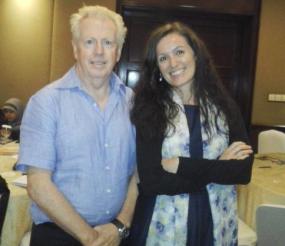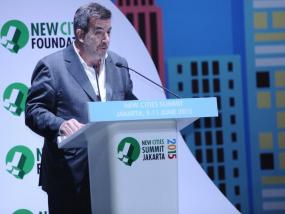Dewi Fortuna Anwar is one Indonesia’s most well known experts in International Relations, and an adviser to Vice President Jusuf Kalla.
A research professor for intermestic affairs at the Indonesian Institute of Sciences (LIPI) and deputy secretary for political affairs to the Vice President of Indonesia, Anwar’s resume also includes stints as Chairman of the Institute for Democracy and Human Rights, The Habibie Center; a member of the Governing Board of the Stockholm International Peace Research Institute (SIPRI); and the Advisory Board of the Institute for Peace and Democracy (IPD) of the Bali Democracy Forum.
She served as a member of the Weapons of Mass Destruction Commission (WMDC) in 2004-2008, and on the United Nations’ Secretary-General’s Advisory Board on Disarmament Matters in 2008-2012. She obtained her doctorate from Monash University, Melbourne in 1990, and has been a visiting fellow at CSEAS, Kyoto University; a visiting professor at SAIS, Johns Hopkins University and a Congressional fellow at the US Congress.
1. What are the most significant factors influencing Indonesian foreign policy?
Well, there is not a single factor, but rather several factors. Of course, first, our internal reality, but secondly, and quite as important, is external factors.
The internal reality is that Indonesia is still a developing country. One of the most important priorities for us remains economic development. We still have a long way to go to eradicate poverty, to create welfare, to increase standards of living, and to grow beyond the current growth that we enjoy. You know, Indonesia does not want to be in “the middle income trap”. So I think that it has been made very clear by the President [Joko Widodo] that Indonesia’s foreign policy should deliver the benefits directly to the wider public, which means that it is benefiting our economic development.
Secondly is our geography, which has also become a very important factor in foreign policy. We have always been an archipelagic country, we have pronounced ourselves to be an archipelagic state - “wawasan nusantara” has been around since 1950s - and we have been very proud in our ability to push for the recognition of UNCLOS (United Nations Convention on the Law of the Sea). But, in reality, we have very limited control of our archipelagic territory.
For a long time, mostly during the New Order period, the focus of our defense strategy, our development, was very land-based. Control of land is the control of people, and we have tended to neglect the exploitation of the resources and the taking advantage of the riches of our territorial waters and our exclusive economic zone. We have not really been able to safeguard our waters from people who have carried out illegal fishing, and we have lost our resources to illegal fishing. We have not been so good in ensuring the safety of our seas from various criminal activities: transnational crime such as people smuggling, drug trafficking, and so on. So the control of our maritime area has also become very, very important.
As Pak Rizal Sukma [Director of the Center for Strategic and International Studies, Indonesia] explained, the maritime fulcrum strategy is not just an element of foreign policy, it is also an economic development strategy, and it is also a defense strategy. The maritime fulcrum comprises of at least five issues.
The first is increasing maritime awareness that we are an archipelagic state, and therefore we should be aware of what we have to do in order to ensure that we are able to develop to our full potential. Second is improving maritime connectivity: building ports, improving shipping, and developing economic linkages between the islands. The third is our security and maritime defense: we must ensure that, particularly in areas where other countries have overlapping territorial claims and we are bordering with South China Sea, where there is a potential conflict there, we must be aware of maritime security. Then there is maritime diplomacy, we have to ensure that regarding the areas with unresolved territorial boundary claims, we must really speed up the negotiations. And, of course, improving the welfare of the people, particularly in coastal areas.
These are some of the elements of the maritime fulcrum, and as you can see, the element of domestic policy is also the element of foreign policy.
2. Looking at the elements of the global maritime fulcrum, it seems like we are only focusing on increasing our national maritime capability. What is global about it?
Well, it is global in the sense that Indonesia, because of its strategic position - we are in the middle of two oceans, the Pacific Ocean and the Indian Ocean - the majority of the international sea lanes are located within Indonesian territorial waters. Whatever our policy is, it cannot be simply national. It has to take into account the strategic interests of other countries. We have to ensure that we are able to be responsible in managing our territory without allowing others to violate our sovereignty, without allowing others to exploit our resources.
So precisely because of our location, our maritime policy has to have global elements; we cannot afford to pretend that we are alone here. If we are somewhere in the Arctic, maybe there are less global elements, but precisely because we are located in the middle of a sea navigation area, whatever we do must have global elements. We are a fulcrum, not simply an axis. A fulcrum is, if you look at a wheel, it something around which the wheel rotates, so it is very important.
3. Indonesia is located in the Asia-Pacific, which is a fast-growing dynamic region. There are issues with the rise of China, the return of Russia, and also the US rebalancing toward Asia. How do you think Indonesia should position itself?
I think the biggest issue is that Indonesia cannot afford to be inward looking, we have to be aware of all of the challenges and opportunities. The presence of these great powers has presented a challenge for us. If we are weak, if we are not able to become an actor, but only a passive player, then we’ll simply be exploited: we’ll be exploited as market, we’ll be exploited as a port for the games of the big powers and so on. We’ll always be worried that we are the victim.
But Indonesia is a big country, we have been independent for 70 years, our economy is growing, our political system is respected and recognized as the third largest democracy. As a country, we are now united even though we have some problems, but compared to other countries in the world, nationally we are united. We are prosperous, although we have some pockets of poverty. We have a lot of achievements that we can be proud of. So I think that we should play to our strengths, we should be one of the players, the big actors.
After all, Indonesia has a 250 million population, bigger than Japan. Our economy, based on PPP [purchasing power parity] is only number 10, we have to go higher than that, we ought to be number four. We have to be able to deploy our military personnel at any given time, so we have a lot of things going for us. We should not simply see ourselves as a victim, we should be a player. We should strategically place ourselves in that position, where we can benefit from the international stage, but we can also be contributing globally or regionally.
4. How important is ASEAN for Indonesia?
ASEAN is always important to Indonesia, a cornerstone of our foreign policy. The peace, stability and prosperity of the immediate Southeast Asian region are indispensable to Indonesia's wellbeing. ASEAN has been instrumental in maintaining relatively harmonious relations between the member states. Equally important, membership in ASEAN has enhanced the leverage of individual ASEAN members as well as the region as a whole in dealing with external powers.
ASEAN has played an important role in ensuring the strategic autonomy of Southeast Asia in the face of competition with the major powers in East Asia. Rather than allowing one or two major powers to dominate the regional order, ASEAN has strived to be the primary driver in a wider regional community building process. ASEAN has succeeded in creating inclusive forums where all of the major regional powers can meet regularly, such as through the establishment of the ASEAN Regional Forum and the East Asia Summit.
5. You have expressed the need for a security community in regard to the South China Sea dispute. Do you think that ASEAN can work as such, given that critics that say ASEAN and the ASEAN Regional Forum (ARF) are only a ‘talk shops’?
ASEAN has worked as a security community in the sense that we have maintained peace and there is not a possibility of open warfare between the ASEAN member states. History shows that there has not been a single open conflict among ASEAN members, with the exception of the small border incident between Cambodia and Thailand a few years ago. Although it has no enforcing mechanism the existence of the Treaty of Amity and Cooperation (TAC) in Southeast Asia has succeeded in defusing conflicts and in persuading ASEAN members to resolve their differences and territorial disputes through peaceful means.
Even if the ARF is only regarded as a "talk shop" it is better than being a “war shop”; at least through the ARF, ASEAN can get these actors talking, not firing at each other. ARF, with all of its shortcomings, is an important forum for confidence building measures and preventive diplomacy. Given the complexity of many of the territorial disputes and its large membership, and the fact that the ARF is only a loose forum, it is quite unrealistic that it can play an effective role in resolving conflicts.
With regards to the South China Sea, it is important that we in Indonesia and ASEAN as a whole do our utmost to ensure that the many overlapping territorial claims do not cause open conflict and instability that can threaten our overall maritime security. Although Indonesia is not a claimant in the Spratley Islands, as an archipelagic state with close trading relations with Northeast Asian countries, any security disturbances in the South China Sea will have a direct impact on our national welfare. That is why ASEAN must work hard to ensure the acceptance of a binding Code of Conduct (CoC) in the South China Sea. Similar to TAC, the CoC will ensure that all disputes must be resolved peacefully.
Although one cannot foresee a final resolution of the various overlapping claims, we must work hard to manage the potential conflicts and ultimately create a security community concerning the South China Sea.










%20resized.png)
